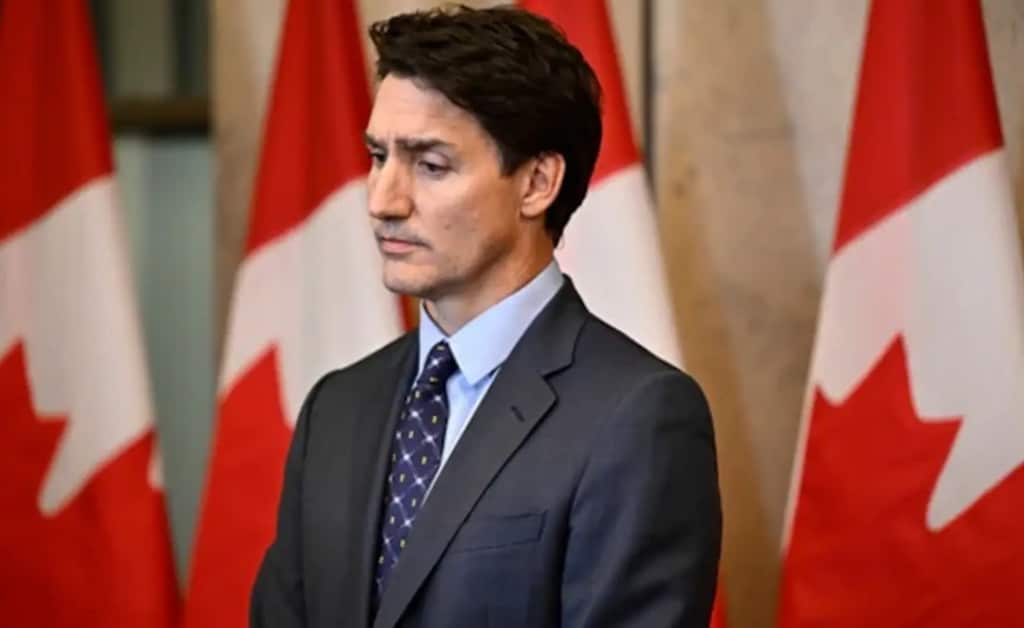Politics
Many Canadians Think Trudeau’s Too Weak to Deal with Trump

With discussions heating up about former US President Donald Trump’s potential return to the White House, concerns have surged regarding Canada’s ability to navigate this challenging political dynamic.
Many Canadians are questioning if Prime Minister Justin Trudeau has the strength to effectively deal with a leader as unrelenting as Trump. Does Trudeau, whose approval ratings have plummeted in recent years, have what it takes to safeguard Canadian interests?
US President Trump’s “America First” agenda, known for aggressively prioritizing US interests, has left the Trudeau government scrambling to respond. President Trump has taken decisive actions that sometimes bruise Canada’s economy, slapping a 25% tariff on Canadian steel and aluminium exports on Monday and looming further tariffs at month’s end.
For many, the Trudeau Liberal’s responses seemed reactive rather than proactive. Critics argue Trudeau has failed to stand firm, leaving Canada vulnerable to the whims of one of the most unpredictable US presidents in history.
His perceived inability to respond has caused many Canadians to wonder if he’s the right leader to handle a Trump resurgence. Some believe Trudeau is purposely pushing for tariffs to help the Liberals improve their political standing.
Trudeau Faces Criticism for Past Performance
During Trump’s first presidency, Canada faced multiple challenges, including renegotiating the North American Free Trade Agreement (NAFTA). Although the agreement ultimately became the United States-Mexico-Canada Agreement (USMCA), many observers felt Canada had come out with the short end of the stick. While Trudeau celebrated the deal as a diplomatic success, critics pointed out that it involved significant concessions, particularly in key Canadian industries like dairy.
Additionally, Trudeau’s approach to addressing Trump’s brashness often relied on calm diplomacy and public platitudes. While appealing to some, this “sunny ways” style appeared ineffective under the shadow of Trump’s hardline tactics.
Many Canadians are now wondering whether Trudeau has strengthened his approach or if the country risks facing déjà vu.
It’s not just Trudeau’s past dealings with Trump that raise red flags for Canadians. A broader narrative has emerged that paints Trudeau as weak on key issues. Domestically, his struggles with mounting inflation, a housing crisis, and multiple ethical scandals have eroded trust in his leadership. Internationally, experts label him unprepared to meet the challenges of a potential Trump second term.
Foreign interference scandals and accusations of delayed action on pressing issues, like China and India’s election meddling, have further dented Trudeau’s credibility. Meanwhile, his commitment to a globalist agenda contrasts sharply with Trump’s nationalist rhetoric, leaving many doubting Trudeau’s ability to defend Canada on a global stage.
Could Poilievre Change the Narrative?
Pierre Poilievre, leader of the Conservative Party of Canada, is an intriguing figure in this debate. Known for his sharp rhetoric and no-nonsense style, Poilievre’s approach contrasts dramatically with Trudeau’s. Polling data suggests Canadians see him as a potentially stronger negotiator when facing a figure like Trump.
Poilievre has tried to portray himself as the antidote to Trudeau’s perceived weakness. Addressing economic challenges and promising to restore Canada’s competitive edge, he’s appealing to Canadians who fear being sidelined in US-Canada relations. His critics, however, argue that alignment with certain Trump policies may not necessarily serve Canadian interests. Is he prepared to stand firm, or is this tough talk just an election strategy?
Canada’s economy, deeply tied to the United States, is always impacted by shifts in American policies. A Trump reelection would likely see the return of aggressive trade negotiations, a push for energy independence, and tougher immigration policies—issues that directly impact Canadians.
Trudeau’s critics argue that his policies have left Canada underprepared to meet these challenges. Rising debt, stagnant productivity growth, and overwhelming public dissatisfaction with his economic management have created vulnerabilities. Trump’s “deal-making” philosophy could exploit these weaknesses, potentially leading to harsher terms for Canada in future agreements.
Trudeau’s reliance on identity politics has also created divisions within Canada. While he heralded inclusivity, critics argue that this approach has sometimes overshadowed effective policymaking. Trump’s rhetoric, heavily laden with nationalism, frames a stark cultural and ideological contrast.
As tensions between progressive and conservative ideologies grow, Trudeau’s strategy of unapologetic liberalism may hinder his ability to negotiate with the Trump-led US. Navigating this terrain requires personal conviction and tangible results—something many feel has been lacking during Trudeau’s tenure.
Canadian sentiment doesn’t seem to work in Trudeau’s favour. From the NAFTA negotiations to tariffs and disputes over energy pipelines, Trudeau’s legacy is marked by compromises that haven’t always delivered favourable results for Canada.
To many, he seems outmatched when dealing with aggressive leadership styles like Trump’s.
In contrast, Trump earned a notorious reputation for outmuscling foreign leaders and demanding more favourable deals for the US. For Trudeau to succeed against such a force, he’d need to demonstrate a new level of political and strategic acumen—qualities some Canadians aren’t sure he possesses.
The political climate in Canada is shifting rapidly. Trudeau’s stepping down before the next election has added more uncertainty, shifting the focus to whoever succeeds him.
With Conservative leader Poilievre steadily gaining popularity, a power transition could bring about yet another recalibration in US-Canada relations. Whether this change would benefit Canada is far from guaranteed. Many Canadians wonder if strong rhetoric will be enough to counter the pressures of a second Trump presidency.
As discussions about a Trump comeback grow louder, Canadians have good reason to worry. Trudeau’s past performance, marked by concessions and reactive strategies, leaves much doubt about his ability to protect Canadian interests.